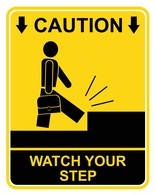 You’ve parked safely. Turned the ignition off. Gathered that bag, the coffee mug, maybe some groceries, and head out the car door.
You’ve parked safely. Turned the ignition off. Gathered that bag, the coffee mug, maybe some groceries, and head out the car door.
There’s a zilch chance of a car-related injury at this point, so it’s all good, right?
Wrong.
There are claims out there where insurers are asked to pay for injuries sustained even after a driver exits their vehicle, and the most major of those make oddball headlines for oddball stories. Here’s a look at two of those cases.
(Something we should mention is that just because a person files a claim doesn’t mean they’ll get paid for it. In both of these cases, courts ended up saying that the insurer didn’t need to pay on the claim.)
Allstate Spared as Michigan Woman Slips, Sues
One of those cases, which made it all the way to the Michigan Supreme Court, involved ice, a car door, and a major fail from the woman who closed it.
On an icy December morning in 2005, Mona Lisa Frazier broke her ankle as she slipped on ice shutting her passenger door. Frazier filed a personal injury protection (PIP) claim with her car insurer, Allstate, which initially issued payments.
Michigan’s no-fault system dictates that policyholders hurt in crashes involving a parked car deserve PIP compensation. The catch? The law says the injury has to be “a direct result of physical contact with equipment permanently mounted on the vehicle” or if the person was hurt while “occupying, entering into, or alighting from the vehicle.”
Allstate said it was justified in stopping claims payments after the insurer got word from on-scene paramedics that Frazier likely hadn’t touched the car door during the slip-and-fall incident.
Frazier sued and initially won her case, but in late 2011, the high court handed down a split decision in favor of Allstate, citing the fact that Frazier had already finished “alighting from” the vehicle when she fell.
Ontario Man Trips on Curb
This month, a superior court in Canada also ruled against a policyholder’s claim that he should be compensated for car-related tripping.
And, also like the Michigan case, at question was whether the trip was really related to the car or not.
Court documents say that, in April 2011, Maurice Prest parked his car at home, exited and “walked to the end of his car”—and then it happened.
Prest “tripped over a concrete curb that … ‘sticks out’ from the wall of the parking garage.”
Prest claimed that his right hand was touching the car in the course of tripping, warranting him claim compensation.
The Ontario Superior Court judge disagreed.
“Here, the only role played by the motor vehicle was that the respondent drove it to the general location of where the incident occurred,” the judge said in his ruling. “The use of the car had ended without injury being suffered. Mr. Prest had left the car and then was injured by a new intervening act, namely when he tripped over the curb.”
The Final Verdict
Looking at these two stories, a policyholder obviously shouldn’t expect easy claims payments for injuries sustained by a fall, trip, drop, slide and/or stumble, since car insurance companies are unlikely to issue such payments without a fight.
Those gutsy policyholders who still believe they deserve payment can take their case to court, but, based on those aforementioned cases, they should expect a long process with mind-boggling discussions of things like what constitutes “equipment permanently mounted on the vehicle” and a likely unfavorable end.